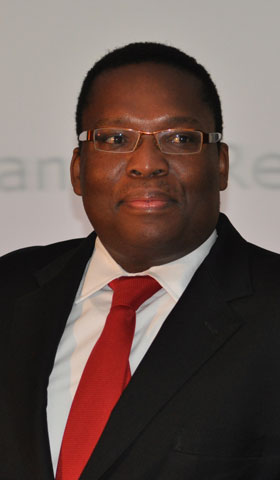
Benjamin Mophatlane, CEO of JSE-listed IT services group Business Connexion, has warned that SA is slipping down the information and communications technology (ICT) rankings when compared to the rest of Africa and has no clear vision or “master plan” to grow the industry.
The country has failed to use ICT as a tool to create jobs, he says. And it’s falling behind some other African countries, especially those in East Africa, which are actively attracting foreign direct investment and positioning themselves as innovation centres on the continent.
“As Africa’s largest economy and as one of the G20 countries, [Internet penetration] is one of the areas where we should be accelerating faster than everywhere else [on the continent],” he says.
“Look at Kenya and Rwanda. They are laying optic fibre at a hell of a speed, yet we don’t even know what the end game is.”
Mophatlane says hard questions need to be asked about whether government’s policy of “managed liberalisation” of SA’s telecommunications industry has worked. “My concern is that as a country we are going backwards. Successive ministries have said they wanted to create a Silicon Valley in Cape Town or Johannesburg and for SA to become a viable place for business process outsourcing. We have failed miserably at both,” he says.
“Kenya is looking at creating a Silicon Valley. You can see what happens when you allow liberalisation to happen. The question is what are we doing in SA?”
He suggests the country would do well to consider creating a “super ministry” for ICT and says government ought to liberalise the sector fully. Asked what his priorities would be if he were appointed as communications minister, Mophatlane says he’d “totally liberalise the sector” and “encourage more players to come in to ensure there is real competition”.
“There’s always been competition in the mobile space, but when you have two dominant players, have the prices really come down? I’d give more spectrum to people who want to use it.”
He also proposes the establishment of “ICT academies” in each of the provinces, focused particularly on software development. “We also need to work closely with universities to create more people in software development,” he says. “There are challenges around maths and science [education] but that should not be an excuse for us having fewer skills.”
Mophatlane says SA needs government to set a clear direction for the industry, outlining exactly what it is that needs to be achieved. He suggests the country could tap into its large diaspora of talent to help grow the industry.
State-owned enterprises also need to be better run, he says, questioning whether companies such as Sentech and Broadband Infraco have been given the financial and other support they need to succeed. “If you look at a company like Sasol, over many years it has become a world-class organisation with the right level of support and the right skills. There’s no reason Infraco and Sentech can’t become world-class companies. But we have to be mindful of the role of the state and that these companies have to be run along commercial lines. These enterprises can be successful but … they need to be properly staffed with the right management and with a clear mandate of what is required of them.”
Similarly, he says, with the right support, Telkom could become a leading global operator in much the same way as fixed-line incumbents in the UK, France, Germany and Japan have become strong international players. “But it’s going to require help and expertise.”
Mophatlane says there have also been too-frequent changes at the top of the department of communications, which has had three ministers in as many years. “It becomes difficult to set policy direction and then pursue your goals.”
He says that despite the problems, SA is still seen as a gateway to the rest of Africa. But, he adds, East Africa is “going to provide major competition”.
SA mustn’t end up being just a sales and marketing place for multinational ICT companies. Rather, Mophatlane says, the environment must be created for them to establish innovation hubs, to build infrastructure like data centres and convince them to establish their Africa headquarters on SA soil. — (c) 2012 NewsCentral Media




